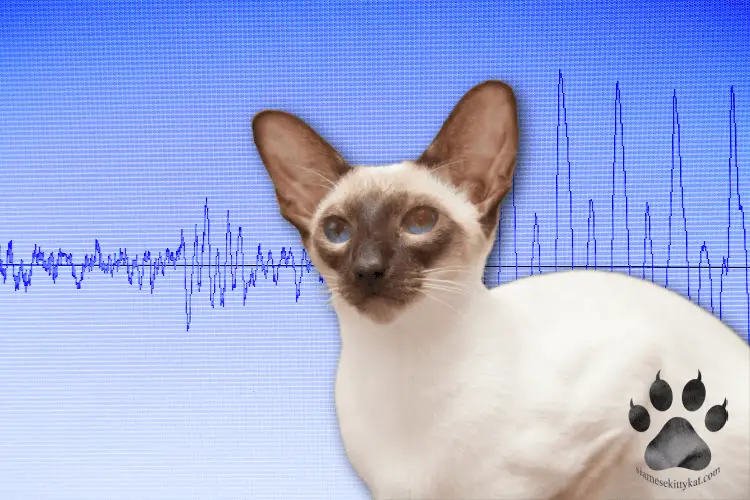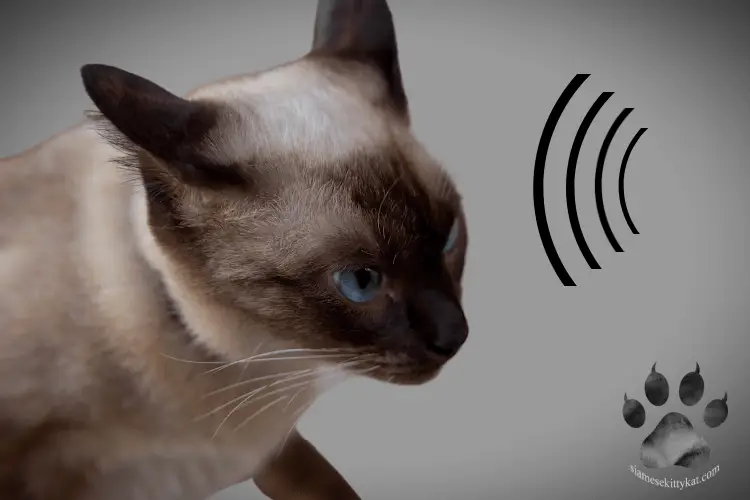Cats have always been curious and responsive animals when it comes to noises. One sound that seems to make cats react with enthusiasm is the simple “pspspsps” sound.
Both my Siamese cats, Batman and Robyn, would come running into the room whenever I’d make this noise. Their eyes are wide open in anticipation of something exciting.
Research suggests cats are able to detect this frequency due to their superior hearing range.
Let’s find out more why cats love the “pspspsps” noise so much.
Why Do Cats Love the “Pspspsps” Noise So Much?
Cats seem to have an affinity for certain sounds humans find peculiar. One such sound, which cats are fond of, is the “pspspsps” noise. This sound, according to Susanne Schötz, operates at a frequency much higher than most speech sounds.
Cats have a hearing range from 48 Hz to 85 kHz. The sound produced by “pspspsps” fall within this higher frequency range, making it an attractive stimulus for cats.
Cats also perceive the “pspspsps” sound as something unique and interesting. It sparks a reaction in cats, similar to how certain frequencies trigger instinctive responses in other animals.
Why do Cats React to High-Pitched Sounds?

Cats are known for their excellent hearing and acute sense of sound. But why do cats react so strongly to high-pitched sounds?
We may never know why our feline friends are so sensitive to certain sounds. However, research suggests several possible explanations.
- One theory is that cats respond to high-priced sounds because they perceive them as danger signals. Cats’ sensitive ears pick up the higher frequencies and cause them to become alert and wary of their surrounding environment.
- High frequency sounds are associated with small animals like mice, which happen to be a prey for a cat. These small creatures communicate using high frequency noises, and cats use this as a sign that food is nearby.
- Another explanation is due to the fact that cats’ hearing range is much wider than ours. A cat’s hearing range spans from 48 Hz to 85 kHz. A human’s hearing range only goes up from about 20 Hz to 20 kHz.
This means cats can hear far more intense and higher frequency sounds than we can. This could explain why cats are so easily startled by loud noises and whistles.
Cats feel fear and anxiety when they hear higher pitched noises, as they are unable to detect the source of the sound. Certain high pitch noises can have positive associations for cats too in some cases.
Many felines enjoy playing with toys that make noise when they move, like rattles and squeaky balls. These mimic prey noises such as small rodents and birds, making them more exciting for cats.
Additionally, many domesticated cats also respond well to their own name when called in a higher pitch. This has been associated with rewards such as food and cuddles.
What do High-Frequency Sounds Do to Cats?
1. A study revealed that high-frequency sounds can cause seizures in cats. These are more common in older cats.
The most common triggers for this, according to Live Science, are crinkling tinfoil, hitting a ceramic bowl with a metal spoon and tapping glass.
These sounds may not be loud for us, but they could be uncomfortable or even painful for cats. You should avoid exposing your cats to these types of noises as much as possible to prevent seizure from occurring.
2. High-pitched noises can trigger strong behavioral responses in cats. These include stress, crouching down in fear, fleeing or hiding away, and even aggression.
Loud music or thunderous drum rolls may cause cats to run away. Some cats may become aggressive towards noise they perceive as threatening.
The effects of exposure to high-frequency sounds may vary depending on how long cats are exposed to it. Long-term exposure may cause psychological distress in some cats, including depression and anxiety.
What Frequency will Annoy a Cat?

Cats can hear up to 85 kHz. This high-frequency sound can be completely inaudible to us, but can be irritating and annoying to cats.
You might notice your cat flinching or appearing agitated because of the frequency of the sound.
Cats, however, do not experience all frequencies in the same way. Some may find certain sounds more tolerable than others, depending on their temperament and sensitivity.
What Sounds do Cats Hate?
1. Hissing Sounds
Hissing is the most well-known sound cats don’t like. It’s a defensive mechanism cats and other animals use when they feel threatened. Hissing cats are trying to scare off whatever is causing them stress.
Hissing is also a way for animals to communicate their displeasure. You know it’s not a pleasant experience if you’ve ever been hissed at by your pet.
2. Loud noises. Cats don’t like loud and sudden noises. Examples include thunder, fireworks, vacuum cleaners, blenders, and smoke alarms. Even the sound of the doorbell ranging can be alarming to some cats if they are not used to it.
3. Repetitive Noises. Cats also find repetitive noises quite annoying.
Things like ticking clocks, dripping faucets, and creaky floors can bother cats if the sound is too loud or constant.
Some cats may even become distressed if they hear a music playing over and over again. Try using calming music instead to help reduce their stress levels.
4. Some High-Pitched Noises
The frequencies of sharp, high-pitched noises can cause discomfort in cats. Cats perceive these to be much louder than they actually are. Examples of high-pitched noises cats don’t enjoy include car alarms, police sirens, or a baby’s scream.
The intensity of the sound is too much for the feline’s delicate senses. Thus, the cat responds with fear and confusion.
5. Yelling/Arguments
Cats are sensitive to our emotions and can tell when we’re upset or angry. This means, if two people are arguing, your cat will sense the tension and pick up on the negative emotions coming from their humans.
6. Loud banging or clanging noises
Things like banging pots and pans or slamming doors can startle cats out of their sleep.
Cats don’t appreciate sudden movements or startling gestures either. They prefer slow, gentle motions instead. This means any sudden hand gestures should be avoided, especially when they’re trying to sleep.
7. Popping sounds
These include the popping of balloons or plastic bags. Cats react negatively to these sounds because they cannot comprehend why something suddenly disappears in front of them. This lack of understanding results in fear and confusion among felines.
Conclusion
Cats are very receptive to sounds and noise. They are easily overwhelmed and stressed by excessive noise. It is therefore essential for you to take steps in creating a calm, peaceful environment for your cat.
Keep loud noises at a minimum or give your cat a safe place to escape to. Showing your cats plenty of love and attention can also help them feel secure in their environment.
We can create an inviting atmosphere for our furry friends by understanding what sounds they find attractive and frightening.
Want to immerse yourself more in the captivating world of Siamese cats? I’ve got all the information you need from their distinct color points to their fun personalities: Siamese Cats: Unique Features and Personality

